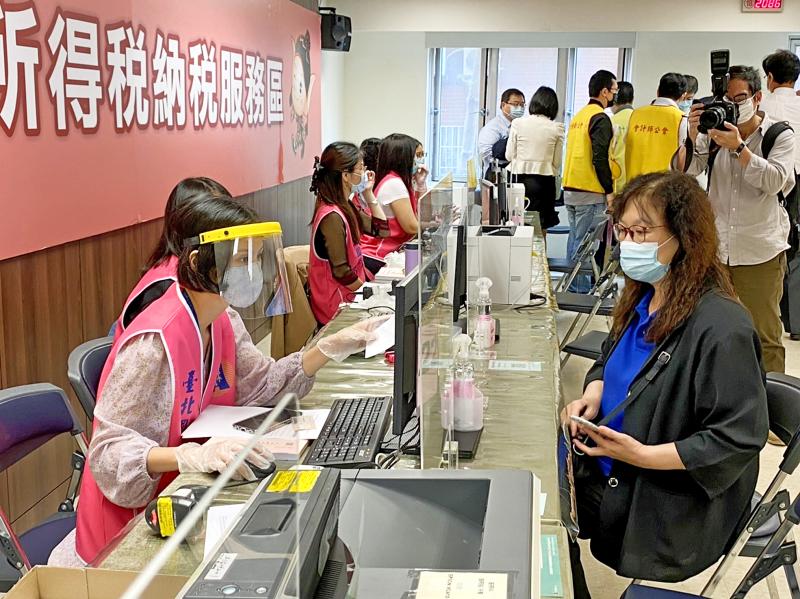Banks, insurers and brokerages in Taipei and New Taipei City are to open as normal tomorrow, the Financial Supervisory Commission said on Saturday.
All financial service providers have been instructed to ensure uninterrupted customer services while following the cities’ tightened disease prevention measures, the commission said.
The announcement came after the Central Epidemic Command Center raised the COVID-19 alert for the two cities to level 3 through Friday next week, calling on the public to avoid unnecessary travel, activities and gatherings, banning indoor gatherings of more than five people and outdoor gatherings of more than 10 people, and implementing sector-specific rules for businesses.

Photo: Allen Wu, Taipei Times
To reduce person-to-person contacts, the Ministry of Finance said that National Taxation Bureau offices in northern Taiwan would stop accepting in-person income tax filings.
The offices in Taipei, New Taipei City, Keelung, Taoyuan and Yilan would not accept tax filings until Friday next week, but remain open for other purposes, it said, adding that disease prevention measures, such as checking visitors’ temperatures, would be in place.
The ministry on Wednesday last week announced that the deadline for filing individual and corporate income tax for last year has been extended by one month, to June 30.
It urged people to file their taxes online, which can also be done using a smartphone.
The Securities and Futures Bureau said that listed companies would still have to hold in-person annual shareholders’ meetings, but control the number of participants, guaranteeing that no more then five people attend a meeting in the same room.
The requirement for in-person shareholders’ meetings is stipulated in the Company Act (公司法) to safeguard the participation rights of minority shareholders, it said.
Despite a provision in the Securities and Exchange Act (證券交易法) that shareholders’ meetings must be held before the end of June, the bureau said it would on a case-by-case basis decide whether companies that do not meet this deadline be exempted from penalties.
Commission data showed that 261 listed companies have scheduled shareholder meetings between tomorrow and Friday next week.
Of those companies, 28 had more than 50 shareholders attending their meetings in person last year, the commission said.
Additional reporting by CNA

South Korea’s equity benchmark yesterday crossed a new milestone just a month after surpassing the once-unthinkable 5,000 mark as surging global memory demand powers the country’s biggest chipmakers. The KOSPI advanced as much as 2.6 percent to a record 6,123, with Samsung Electronics Co and SK Hynix Inc each gaining more than 2 percent. With the benchmark now up 45 percent this year, South Korea’s stock market capitalization has also moved past France’s, following last month’s overtaking of Germany’s. Long overlooked by foreign funds, despite being undervalued, South Korean stocks have now emerged as clear winners in the global market. The so-called “artificial intelligence

‘SEISMIC SHIFT’: The researcher forecast there would be about 1.1 billion mobile shipments this year, down from 1.26 billion the prior year and erasing years of gains The global smartphone market is expected to contract 12.9 percent this year due to the unprecedented memorychip shortage, marking “a crisis like no other,” researcher International Data Corp (IDC) said. The new forecast, a dramatic revision down from earlier estimates, gives the latest accounting of the ongoing memory crunch that is affecting every corner of the electronics industry. The demand for advanced memory to power artificial intelligence (AI) tasks has drained global supply until well into next year and jeopardizes the business model of many smartphone makers. IDC forecast about 1.1 billion mobile shipments this year, down from 1.26 billion the prior

People stand in a Pokemon store in Tokyo on Thursday. One of the world highest-grossing franchises is celebrated its 30th anniversary yesterday.

Chinese artificial intelligence (AI) start-up DeepSeek’s (深度求索) latest AI model, set to be released as soon as next week, was trained on Nvidia Corp’s most advanced AI chip, the Blackwell, a senior official of US President Donald Trump’s administration said on Monday, in what could represent a violation of US export controls. The US believes DeepSeek will remove the technical indicators that might reveal its use of American AI chips, the official said, adding that the Blackwells are likely clustered at its data center in Inner Mongolia, an autonomous region of China. The person declined to say how the US government received